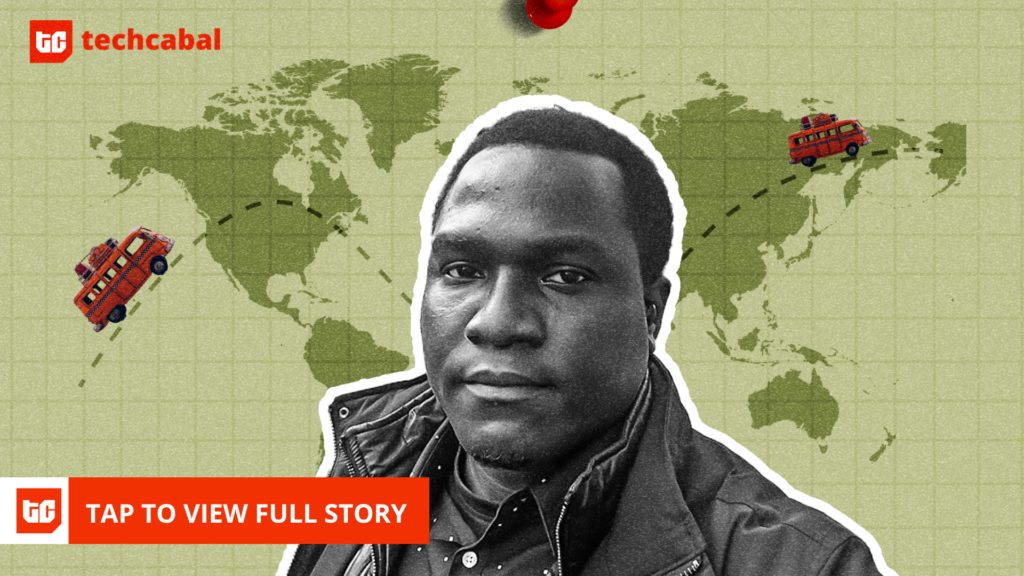Nelson Ikan, a Nigerian who once trained as a materials engineer and dreamed of joining the oil and gas elite now works in healthcare. Ikan is a senior project manager at the University Hospitals of Derby and Burton, helping digitise patient care across six National Health Service (NHS) sites in the UK. But before he arrived here, he scrubbed floors at conference centres just to keep the lights on.
Recently, conversations have reignited online over the career pivots Nigerian migrants make in an attempt to attain success in their new countries of residence. From students juggling multiple jobs to professionals who’ve swapped offices in their home country for factory jobs, the costs are often emotional, physical, and financial.
In the UK, one recurring challenge with settling into a career after relocation is the desperate scramble for a Certificate of Sponsorship (COS), a mandatory document issued by a licenced UK employer which allows a person to apply for a Skilled Worker visa. Without it, many migrants, particularly international students and dependents, are unable to stay legally after their existing visa expires.
“I had to survive. A cleaning job helped me stay afloat.”
Nelson Ikan arrived in the UK in December 2021 as a dependent. His wife had secured a student visa to pursue a master’s degree in human resource management. While she studied, Ikan set his sights on rebuilding his career in a new country. “I didn’t work immediately when I came in. I was okay for a couple of months, trying to get settled,” he recalled. “But soon, I needed to raise money to stay afloat.”
He began applying for jobs, any job, that he qualified and sometimes was overqualified for. Offers came in, including one from Shell Energy to work at a gas station, and another from a healthcare trust in Warwickshire. Ikan turned both offers down. “I didn’t take those jobs because I didn’t want to get stuck doing something that didn’t align with what I had planned,” he said. “It wasn’t just about getting a job; for me, it was about getting the right kind of job.”
But after burning through his savings, it was clear he needed to get a job, and fast. Weeks after rejecting those two offers, he took up a cleaning job out of necessity. “I worked at big conference centres. When the event finishes around 9:00 p.m., cleaners come in around ten and work twelve hours or eight hours,” he said. “We got paid as much as £15 an hour. If you work eight hours, that’s about £120, minus bonuses.”
“When I was working in the bank in Nigeria, I was earning ₦350,000 (£751) a month,” he said. But in the UK, he was earning at least ₦56,000 (£120) daily. “It gave me energy and I was happy.”
More than the money, what lingered for Ikan was the perception around the kind of work he did. “Here, there’s dignity in labour. Someone working as a cleaner is not seen as lesser than a doctor. Everyone can afford the same thing. The cleaner just works more hours,” Ikan said.
One night, he worked alongside a Nigerian woman who had been a bank manager back home, he said. “She told me she was here because of her kids and the opportunities the UK gave. She seemed delighted with the work and that stuck with me.”
In the two months he cleaned conference centres, Ikan continued to work out a plan to get back into professional employment.
Back in Nigeria, Ikan had studied materials engineering, interned at Halliburton, had a brief stint in banking, before spending seven years in construction. This, he shared, gave him his first real experience managing big projects. In the UK, when it was time to transition into project management, he leaned into his construction experience. “I had plans of making a life for myself here,” he said. “But I knew I needed something to validate my experience.”
That clarity pushed him to go back to the books. He enrolled in the Project Management Professional (PMP) exam and passed. The certification is globally recognised and often serves as a minimum requirement for serious project roles in the UK. “The PMP gave me more visibility in the corporate world,” he said. “It was what made employers take a second look.”
His breakthrough came shortly after, when he landed a project management role in the NHS at a healthcare trust in Bristol. There, he was assigned to a major digital migration project that was modernising how hospitals tracked and shared incident data.
“The goal was to move from a closed system to an open reporting culture,” Ikan explained. “If an incident happened in one hospital, others could learn from it. Before, only the facility where it happened could see the details.”
The new system encouraged frontline staff, and even patients, to report safety incidents without fear of retaliation. “They were trying to remove the blame culture,” he said. “So people could report more incidents and improve care.”
From Bristol, he moved to a trust in Leicester, where he managed another digital transformation project—this time around pre-surgical assessments.
“It used to be paper-based. You’d come to the hospital, fill forms, do tests, and go home. Now, patients can do it all online,” he said.
The new system streamlined the process. Patients receive a secure link, fill out forms from home, and based on their inputs, are routed into different clinical pathways. “If it’s a low-risk procedure, they don’t have to come to the hospital twice. They just show up on the day of the surgery,” Ikan explained.
Now, he works as a senior project manager at University Hospitals of Derby and Burton, a large NHS trust spanning six hospital sites. His current role focuses on implementing a new electronic patient records system. He described his work as an effort that will affect thousands of staff and patients.
Thanks to flexible working policies in the NHS, Ikan mostly works remotely and coordinates with teams across cities. “I use tools like Microsoft Teams and SharePoint to stay connected,” he said. “Sometimes I go in once or twice a month, other times more, depending on the stage of the project.”
Each project has built on the last, and the common thread has been Ikan’s determination to reinvent himself without losing the technical depth he developed back home.
“It wasn’t easy, but I had to learn how to sell myself properly,” he said. “That PMP wasn’t just a certificate. It gave me a foot in the door.”
Hard truths of migration and moving forward anyway
Beneath every success story of a migrant who makes it in the UK, there are usually a dozen untold stories of the mental wear, disillusionment, and invisible labor it took to stay afloat. Even when things begin to work on the outside, with work permits, job titles, and better pay, the emotional residue of starting over is hard to shake.
The hardest part of migration for Ikan was not just the cleaning job, the job rejections, or the daily fear of running out of time. It was how unpredictable everything felt. In Nigeria, the systems may be broken, but they are familiar. In the UK, the systems function, but they are cold, rigid, and indifferent to anyone without a plan or a strong network.
Before landing a stable job in the NHS, there were moments when he could not even get interviews for roles he felt overqualified for. He once tried and failed to get a warehouse job at Amazon.
Loneliness added another layer of difficulty. In Birmingham, where he lived, Ikan discovered that having a neighbour did not mean knowing their name. Even among fellow Nigerians, everyone seemed busy working multiple jobs, raising families, or keeping up with long shifts.
What helped him push through in the UK was mentorship, grit, and knowing his strengths so he could prepare for the right opportunities.
Yet, Ikan knows how fragile those breakthroughs can be. Without timely advice or a supportive connection, many skilled migrants never transition out of survival mode. The system may not actively stop people from trying, but it certainly does not make success easy.
Now that he has gained a foothold, he is thinking about how to make the path easier for others.
“I want to build something. Something that helps others push through, just like I did,” he said.
Ikan says he is working on an AI-powered job recruitment platform designed to help project managers find and apply to UK companies that are licenced to sponsor work visas. If he can help others avoid the challenges he faced, that would be a success far beyond his own.
* Exchange rate used in the story = ₦466/£1, the average conversion rate in 2022
Mark your calendars! Moonshot by is back in Lagos on October 15–16! Join Africa’s top founders, creatives & tech leaders for 2 days of keynotes, mixers & future-forward ideas. Early bird tickets now 20% off—don’t snooze! moonshot..com



.png)






